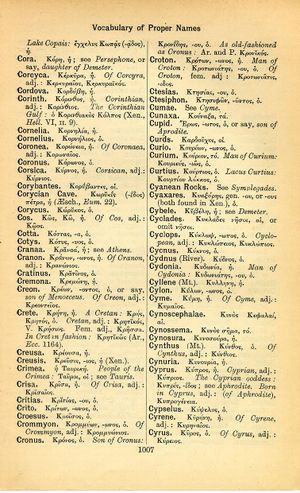Cydonia: Difference between revisions
Κρεῖττον τὸ μὴ ζῆν ἐστιν ἢ ζῆν ἀθλίως → Death is better than a life of misery → Satius mori quam calamitose vivere → Der Tod ist besser als ein Leben in der Not
m (Text replacement - "]]>" to "]]") |
|||
| Line 5: | Line 5: | ||
}} | }} | ||
{{Lewis | {{Lewis | ||
|lshtext=<b>Cydōnĭa</b>: or Cydōnēa, ae, f., = Κυδωνία,<br /><b>I</b> an [[ancient]] and [[celebrated]] [[town]] on the [[north]] [[coast]] of [[Crete]], [[now]] Canea, Mel. 2, 7, 12; Plin. 4, 12, 20, § 59 Sillig N. cr.; Flor. 3, 7, 4.—<br /><b>II</b> Hence,<br /> <b>A</b> Cydon, ōnis, m.<br /> <b>1</b> A Cydonian, Verg. A. 12, 858.—<br /> <b>2</b> A [[son]] of [[Phorcus]], Verg. A. 10, 325.—In plur., Luc. 7, 229.—<br /> <b>B</b> Cydō-nĭus, a, um, adj., Cydonian: [[spicula]], [[poet]]. for Cretan, Verg. E. 10, 59; cf. [[arcus]], Hor. C. 4, 9, 17.—So esp. freq. [[Cydonia]] (and Latinized cotonia, [[cotonea]]) [[mala]]; also absol.: cydōnĭa (cŏtōnĭa, cŏtōnĕa), ōrum, n., a quince or quince-[[apple]], Plin. 15, 11, 10, § 37; Col. 5, 10, 19; Macr. S. 7, 6; Varr. R. R. 1, 59; Col. 12, 47, 1; Prop. 3 (4), 13, 27.—[[Cydonia]] [[arbor]], or absol.: cydōnĭus, ii, f., a quince-[[tree]], Pall. Febr. 25, 21; 25, 20; id. Insit. 99 al.—cydōnĕum, i, n., quincejuice, quince-[[wine]], Dig. 33, 6, 9.—<br /> <b>C</b> Cy-dōnēus, a, um, adj., Cydonian: juvencae, Ov. A. A. 1, 293: pharetrae, [[poet]]. for Cretan, id. M. 8, 22: sagittae, Stat. Th. 7, 339: [[harundo]], Sil. 10, 261.—<br /> <b>D</b> Cydōnītes, ae, adj., Cydonian: vites, Col. 3, 2, 2.—Subst.: Cy-dōnītes, ae, m. (sc. [[οἶνος]] | |lshtext=<b>Cydōnĭa</b>: or Cydōnēa, ae, f., = Κυδωνία,<br /><b>I</b> an [[ancient]] and [[celebrated]] [[town]] on the [[north]] [[coast]] of [[Crete]], [[now]] Canea, Mel. 2, 7, 12; Plin. 4, 12, 20, § 59 Sillig N. cr.; Flor. 3, 7, 4.—<br /><b>II</b> Hence,<br /> <b>A</b> Cydon, ōnis, m.<br /> <b>1</b> A Cydonian, Verg. A. 12, 858.—<br /> <b>2</b> A [[son]] of [[Phorcus]], Verg. A. 10, 325.—In plur., Luc. 7, 229.—<br /> <b>B</b> Cydō-nĭus, a, um, adj., Cydonian: [[spicula]], [[poet]]. for Cretan, Verg. E. 10, 59; cf. [[arcus]], Hor. C. 4, 9, 17.—So esp. freq. [[Cydonia]] (and Latinized cotonia, [[cotonea]]) [[mala]]; also absol.: cydōnĭa (cŏtōnĭa, cŏtōnĕa), ōrum, n., a quince or quince-[[apple]], Plin. 15, 11, 10, § 37; Col. 5, 10, 19; Macr. S. 7, 6; Varr. R. R. 1, 59; Col. 12, 47, 1; Prop. 3 (4), 13, 27.—[[Cydonia]] [[arbor]], or absol.: cydōnĭus, ii, f., a quince-[[tree]], Pall. Febr. 25, 21; 25, 20; id. Insit. 99 al.—cydōnĕum, i, n., quincejuice, quince-[[wine]], Dig. 33, 6, 9.—<br /> <b>C</b> Cy-dōnēus, a, um, adj., Cydonian: juvencae, Ov. A. A. 1, 293: pharetrae, [[poet]]. for Cretan, id. M. 8, 22: sagittae, Stat. Th. 7, 339: [[harundo]], Sil. 10, 261.—<br /> <b>D</b> Cydōnītes, ae, adj., Cydonian: vites, Col. 3, 2, 2.—Subst.: Cy-dōnītes, ae, m. (sc. [[οἶνος]]), quince-[[wine]] (cf. B. fin.), Pall. Oct. 20.—<br /> <b>E</b> Cydōnĭātae, ārum, m., the inhabitants of [[Cydonia]], Liv. 37, 60, 3; Plin. 8, 58, 83, § 228. | ||
}} | }} | ||
Revision as of 09:29, 13 August 2017
English > Greek (Woodhouse)
Κυδωνία, ἡ.
Man of Cydohia: Κυδωνιάτης, -ου, ὁ.
Latin > English (Lewis & Short)
Cydōnĭa: or Cydōnēa, ae, f., = Κυδωνία,
I an ancient and celebrated town on the north coast of Crete, now Canea, Mel. 2, 7, 12; Plin. 4, 12, 20, § 59 Sillig N. cr.; Flor. 3, 7, 4.—
II Hence,
A Cydon, ōnis, m.
1 A Cydonian, Verg. A. 12, 858.—
2 A son of Phorcus, Verg. A. 10, 325.—In plur., Luc. 7, 229.—
B Cydō-nĭus, a, um, adj., Cydonian: spicula, poet. for Cretan, Verg. E. 10, 59; cf. arcus, Hor. C. 4, 9, 17.—So esp. freq. Cydonia (and Latinized cotonia, cotonea) mala; also absol.: cydōnĭa (cŏtōnĭa, cŏtōnĕa), ōrum, n., a quince or quince-apple, Plin. 15, 11, 10, § 37; Col. 5, 10, 19; Macr. S. 7, 6; Varr. R. R. 1, 59; Col. 12, 47, 1; Prop. 3 (4), 13, 27.—Cydonia arbor, or absol.: cydōnĭus, ii, f., a quince-tree, Pall. Febr. 25, 21; 25, 20; id. Insit. 99 al.—cydōnĕum, i, n., quincejuice, quince-wine, Dig. 33, 6, 9.—
C Cy-dōnēus, a, um, adj., Cydonian: juvencae, Ov. A. A. 1, 293: pharetrae, poet. for Cretan, id. M. 8, 22: sagittae, Stat. Th. 7, 339: harundo, Sil. 10, 261.—
D Cydōnītes, ae, adj., Cydonian: vites, Col. 3, 2, 2.—Subst.: Cy-dōnītes, ae, m. (sc. οἶνος), quince-wine (cf. B. fin.), Pall. Oct. 20.—
E Cydōnĭātae, ārum, m., the inhabitants of Cydonia, Liv. 37, 60, 3; Plin. 8, 58, 83, § 228.

